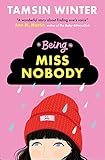
Price: £6.99
Publisher: Usborne Publishing Ltd
Genre: Fiction
Age Range: 10-14 Middle/Secondary
Length: 384pp
Buy the Book
Being Miss Nobody
Tamsin Winter’s debut novel tackles a number of weighty themes – grief, loss, selective mutism, bullying – but does so in a story that is nonetheless full of laughter and very readable.
Rosalind can only speak to her immediate family and to her neighbour, the kindly Mrs Quinney. Originally her parents and teachers put this down to acute shyness, but by the time she finished primary school it had been diagnosed as selective mutism. The diagnosis made things easier at school, but years of therapy have had little effect, and Rosalind is understandably nervous about starting secondary school especially as, on the advice of the therapist, it’s a school where she will know no-one. Her worst fears are realised: she’s branded a freak and either ignored or, worse, bullied. Bullying is rife at Manor High, and she’s not the only one whose life is made a misery by classmates. Rosalind tells no one what is going on, partly through shame and partly out of consideration for her parents, who have an even worse worry to deal with: her little brother Seb has leukaemia and his condition is getting worse. Despite his illness, Seb is resolutely cheerful (he’s obsessed with poo jokes), and he’s thrilled when his big sister tells him she’s starting a blog. In the guise of alter-ego Miss Nobody, Rosalind is something of a superhero, able to expose the bullies and call them out for their cruelty and narrow-mindedness. Soon Miss Nobody has hundreds of followers, and has provoked something of a fight back against the bullying culture. But then Rosalind discovers someone else is using the Miss Nobody persona online and in a very different way – to encourage more bullying; what’s more, one of Rosalind’s own blogs have led to a teacher being victimised by pupils.
The selective mutism puts Rosalind’s need to speak out and the importance of letting others know how you feel in sharp focus. Winter’s descriptions of Rosalind’s experience of her condition are convincing and vivid, and will allow readers to empathise with her special situation, while the story will also make them think about times they might need to speak out too. Mrs Quinney, a committed Christian, inspires Rosalind to consider her own moral compass, and it’s also a book that subtly raises questions about our own moral responsibility.
Rosalind is an appealing central character and her eccentric family provide light relief in what could otherwise be an almost unbearably sad story. In fact it finishes on a positive note, and will thoroughly entertain readers as well as giving them much to think about.
Simon Packham also covers selective mutism in Silenced, as does Faye Bird in What I Couldn’t Tell You.



